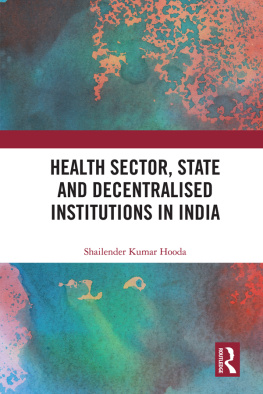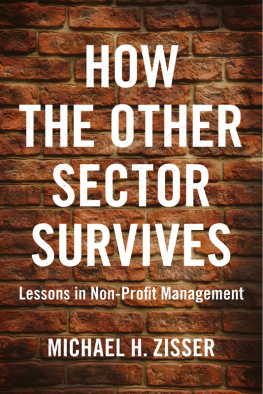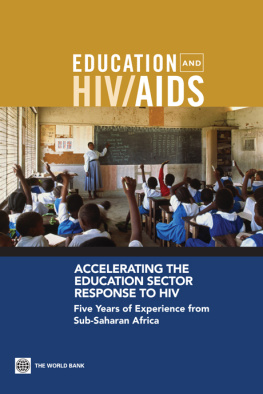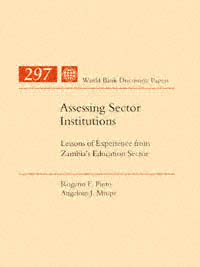| Recent World Bank Discussion Papers |
| No. 229 An Assessment of Vulnerable Groups in Mongolia: Strategies for Social Policy Planning. Caroline Harper |
| No. 230 Raising the Productivity of Women Farmers in Sub-Saharan Africa. Katrine Saito |
| No. 231 Agricultural Extension in Africa. Aruna Bagchee |
| No. 232 Telecommunications Sector Reform in Asia: Toward a New Pragmatism. Peter L. Smith and Gregory Staple |
| No. 233 Land Reform and Farm Restructuring in Russia. Karen Brooks and Zvi Lerman |
| No. 234 Population Growth, Shifting Cultivation, and Unsustainable Agricultural Development: A Case Study in Madagascar. Andrew Keck, Narendra P. Sharma, and Gershon Feder |
| No. 235 The Design and Administration of Intergovernment Transfers: Fiscal Decentralization in Latin America. Donald R. Winkler |
| No. 236 Public and Private Agricultural Extension: Beyond Traditional Frontiers. Dina L. Umali and Lisa Schwartz |
| No. 237 Indonesian Experience with Financial Sector Reform. Donald P. Hanna |
| No. 238 Pesticide Policies in Developing Countries: Do They Encourage Excessive Use? Jumanah Farah |
| No. 239 Intergovermental Fiscal Relations in Indonesia: Issues and Reform Options. Anwar Shah and Zia Qureshi |
| No. 240 Managing Redundancy in Overexploited Fisheries. Joshua John |
| No. 241 Insitutional Change and the Public Sector in Transitional Economies. Salvatore Schiavo-Campo |
| No. 242 Africa Can Compete!: Export Oppotunities and Challenges for Garments and Home Products in the U.S. Market. Tyler Biggs, Gail R. Moody, Jan-Hendrik van Leeuwen, and E. Diane White |
| No. 243 Liberalizing Trade in Services. Bernard Hoekman and Pierre Sauv |
| No. 244 Women in Higher Education: Progress, Constraints, and Promising Initiatives. K.Subbarao, Laura Raney, Halil Dundar, and Jennifer Haworth |
| No. 245 What We Know About Acquisition of Adult Literacy: Is There Hope? Helen Abadzi |
| No. 246 Formulating a National Strategy on Information Technology: A Case Study of India. Nagy Hanna |
| No. 247 Improving the Transfer and Use of Agricultural Information: A Guide to Information Technology. Willem Zijp |
| No. 248 Outreach and Sustainability of Six Rural Finance Institutions in Sub-Saharan Africa. Marc Gurgand, Glenn Pederson, and Jacob Yaron |
| No. 249 Population and Income Change: Recent Evidence. Allen C. Kelley and Robert M. Schmidt |
| No. 250 Submission and Evaluation of Proposals for Private Power Generation Projects in Developing Countries. Edited by Peter A. Cordukes |
| No. 251 Supply and Demand for Finance of Small Enterprises in Ghana. Ernest Aryeetey, Amoah Baah-Nuakoh, Tamara Duggleby, Hemamala Hettige, and William F. Steel |
| No. 252 Projectizing the Governance Approach to Civil Service Reform: An Environment Assessment for Preparing a Sectoral Adjustment Loan in the Gambia. Rogerio F. Pinto with assistance from Angelous J. Mrope |
| No. 253 Small Firms Informally Financed: Studies from Bangladesh. Edited by Reazul Islam, J. D. Von Pischke, and J. M. de Waard |
| No. 254 Indicators for Monitoring Poverty Reduction. Soniya Carvalho and Howard White |
| No. 255 Violence Against Women: The Hidden Health Burden. Lori L. Heise with Jacqueline Pitanguy and Adrienne Germain |
| No. 256 Women's Health and Nutrition: Making a Difference. Anne Tinker, Patricia Daly, Cynthia Green, Helen Saxenian, Rama Lakshminarayanan, and Kirrin Gill |
| No. 257 Improving the Quality of Primary Education in Latin America and the Caribbean: Toward the 21st Century. Lawrence Wolff, Ernesto Schiefelbein, and Jorge Valenzula |
| No. 258 How Fast is Fertility Declining in Botswana and Zimbabwe? Duncan Thomas and Ityai Muvandi |
| No. 259 Policy Affecting Fertility and Contraceptive Use: An Assessment of Twelve Sub-Saharan Countries. Susan Scribner |
| No. 260 Financial Systems in Sub-Saharan Africa: A Comparative Study. Paul A. Popiel |
| No. 261 Poverty Alleviation and Social Investment Funds: The Latin American Experience. Philip J. Glaessner, Kye Woo Lee, Anna Maria Sant'Anna, and Jean-Jacques de St. Antoine |
| No. 262 Public Policy for the Promotion of Family Farms in Italy: The Experience of the Fund for the Formation of Peasant Property. Eric B. Shearer and Giuseppe Barbero |
| (Continued on the inside of back cover) |
|









